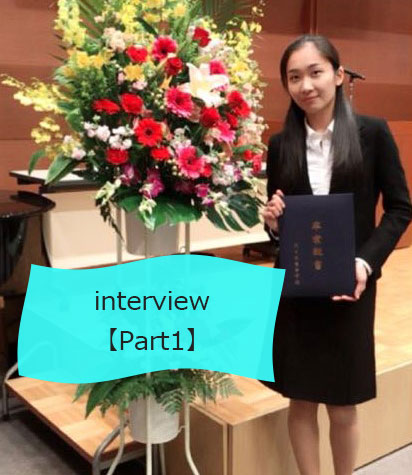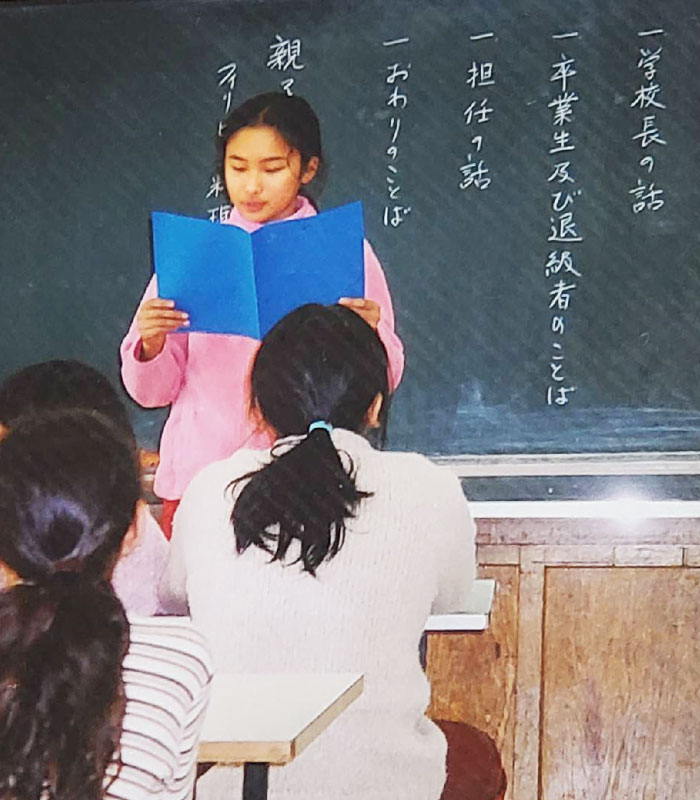Koike Administrative Scrivener Office
Koike Administrative Scrivener Office

Some foreigners who have just started living in Japan may be troubled and anxious about language and cultural differences, such as not being able to fit in at school or work because they don’t understand the language, or being confused about things that were taken for granted in their home country.
So this time, Katsura, a Japanese staff member, interviewed our Filipino staff member “Angelli Sta Ana” (nickname: Angel), who has been came to Japan as a child, We interviewed her about her experiences in Japan, such as the difficulties she faced after coming to Japan, reasons for change, and what she thinks is important in living in Japan.
I’ll tell you about it in Part 1 and Part 2!
I’d be happy if I could ease the minds of foreigners who have also come to Japan and are struggling or stuck due to language and cultural differences, or give them a little courage.

Angel you started living in Japan when you was 9 years old. Why did you come to Japan?

Originally, my mother came to Japan to work. She sent money to my grandparents in the Philippines to help them lives. After my mother gave birth to me in the Philippines, she continued to work in Japan and I was raised by my grandparents in the Philippines. My mother worked very hard in the hope that she would be able to bring me to live with her in Japan someday.
When I was 9 years old, my mother got married to a Japanese man, and I left the Philippines to live with my parents in Japan.

How did you feel when you had to leave the Philippines, where you have lived since birth, to go to Japan? Did you ever want to live with your mother?

I really didn’t want to go to Japan. On the day of my departure, I even ran a fever at the airport!
I enjoyed my time in the Philippines and was very anxious to leave my grandmother and friends. To be honest, I didn’t feel lonely without my parents. Since I had been raised by my grandmother, I didn’t know how to treat my mother, as I had no relationship with her whatsoever. At first living in Japan with my mother and father doesn’t make sense to me. I had no choice but to do as my mother told me, even though I felt resistant.
From the lively and bright Philippines, I felt like I was in a quiet space where I could not hear anything, as I did not understand Japanese when I came to Japan. It was my first time living with my mother and father. At first, I felt uncomfortable and homesick even when I was at home.

I think you would not have been able to catch up with all the people and places you lived with and the environment around you that changed all at once. What was the first barrier or culture shock you felt after coming to Japan?

When I started going to elementary school in Japan, the “language barrier” was still a big problem.
I didn’t understand any Japanese at that time, so I didn’t know what they were saying to me. But from the looks of the people around me, I felt that I was being bullied.
When I first came here, I was teased with the name “Devil” because the name “Angel” was unusual for Japanese people. In the Philippines, it is normal to call each other by nicknames, so I was shocked to be bullied because of my name. I wondered what the problem was with my name, and it made me sad to hear people say bad things about me.
I was also surprised by the “eating raw food” thing. In the Philippines, we don’t usually eat fish raw. When sushi was served in Japan for the first time, I ate squid, but the texture was disgusting and I was so traumatized that I still can’t eat sushi or sashimi.

You don’t like sushi, maybe you shouldn’t have eaten squid at first.
It was hard for you to understand the language in elementary school, but you felt bullied. Was there anyone you could talk to about your difficulties?

In the Philippines, I liked studying and interacting with people, but I felt like I was being denied, and I lost motivation to do anything. But I couldn’t talk to anyone about it.
I felt that I had been forcibly brought to Japan by my mother, and I felt reserved. I had friends from elementary school who took care of me, but I couldn’t open up to them because I knew that they were doing it because they were asked to and that they were taking care of me.


It must have been hard for you to be alone without being able to talk about it. Was there any reason why you gradually got used to life in Japan?

For the first month or two month, my mother came to school with me as an interpreter, but I think the most important thing was that I started going to a Japanese class twice a week, which was different from the elementary school I attended. I attended a Japanese language class from 4th grade to 6th grade. There I studied Japanese with other foreign students who had similar backgrounds to mine. I also made Filipino friends and had a lot of fun there.

How exactly did you learn Japanese there?
It’s hard to teach and learn when you don’t know anything at all.

At first, I learned hiragana in Japanese class by using a karuta card with pictures on it. At first, my mother came with me to the Japanese class and translated for me when I could not understand Japanese. We wrote a diary and exchanged it with the teacher, who corrected our grammar and other mistakes with a red pen. As I learned Japanese little by little, there was also a class where I had to write an essay and present it in front of everyone.

Did your feelings change as a result of attending the Japanese class?

Yes. In elementary school, I was quiet and didn’t say a word, but in Japanese class, I was able to do so without hesitation. I think it was because there was an atmosphere where mistakes were accepted. I learned Japanese little by little in the Japanese language class, and thanks to that, I was able to understand what they were saying little by little in elementary school.

I’m glad that you have a place where you can show your true self, even if you make a few mistakes, they support you and make you feel okay. Did you study Japanese outside of Japanese classes? Did you use Japanese for conversation at home?

I learned the language by watching Japanese anime, music program in TV, and other TV programs and manga. At home, I conversed with my mother in Tagalog. With my father, I spoke in Japanese. I gradually became accustomed to living with my mother and father and began to open up to them.

It’s even more difficult to learn a subject when you’re somewhat used to daily conversation. Did you have any difficulty with that?

Yes. I stumbled in math. I was scared of my math teacher and lost interest in my studies. I missed more and more days of school.

How did you change your mind when that happened?

I told my mother that I wanted to go back to the Philippines. My mother let me go to the Philippines two or three times a year. I spent several months in the Philippines and went back and forth between Japan and the Philippines. I felt refreshed by being allowed to go to the Philippines.

Your mother didn’t keep you away from the Philippines and make you endure being in Japan all the time, but she also valued the time you spent in the Philippines. Maybe it’s good that you didn’t force yourself to shut down, because it’s important for you to stay connected to your home country.

How did your environment change after you graduated from elementary school and started going to junior high school?

I made friends in junior high school, but the atmosphere in the class was bad, and I hated seeing my classmate being bullied. I was also worried about what I would do if I were bullied. The number of days I didn’t go to school increased, and in the second year of junior high school, I quit school and went back to the Philippines.

Have you thought about living in the Philippines while you are traveling back and forth between Japan and the Philippines?
Why did you decide to live in Japan after all?

I was in the Philippines for about two years after I dropped out of school. I thought about living in the Philippines, so I took the entrance exam to a Philippines junior high school as a test and was lucky enough to be pass the exam. However, all the classes at the school in the Philippines were in English, and when I tried to take the classes, I could not understand the content of the class. I realized that the hurdle of learning subjects in English is quite high for me, and that now I can’t understand them unless they are in Japanese. That was the first reason why I thought it would be better to live in Japan.
Secondly, my grandmother passed away. My grandmother told me to take care of my mother, and I knew that I had to work in Japan to support her. I’ve been going back and forth between Japan and the Philippines, sometimes going to school and sometimes not. I realized that I can’t keep being selfish forever. When I saw my cousins in the Philippines working hard, I knew that I had to do the same. So I decided to return to Japan and live in Japan.

With this opportunity, you were able to reflect on your past actions and make up your own mind to live in Japan.

I started going to a Evening classes junior high school that my mother suggested. It was more fun than I had imagined, and the friends and teachers I met there changed me a lot.

What exactly happened that caused you to notice or change?

There were students from all walks of life in the night school. I didn’t realize it at first, but I came to Japan when I was 9 years old and I realized that being exposed to Japanese early on and being able to communicate in Japanese now is a positive thing. Instead of focusing on what I couldn’t do, I was able to focus on what I could do. And the teacher I met at the Evening classes junior high school gave me a lot of encouragement.

What kind of words and encouragement did your teacher give you, and how did it change your mind?

I was so negative and unconfident that I gave up before I even tried, thinking that I couldn’t do anything. At that time, my teacher told me, “You will never know unless you try. You have to try, fail, and learn”. He encouraged me to dance with my friends at the school festival. Even when I was confused, the teacher said, “It doesn’t matter if you are good or bad. The important thing is whether you enjoy it. Do what you enjoy and what you like with confidence,” and that’s how I was able to take on the challenge of dancing. The teacher then told me verbally, “You have good communication skills, and your cheerfulness is a good thing”.
Before, I didn’t know what I wanted to do or what I liked to do, and I felt like I was living a random life. I used to think that everything was too much for me and give up halfway through, but after dancing at the school festival, I realized that I could see a new view by challenging myself without fear of failure, and that it was fun to do something in front of others. Even after graduation, having a place to go back to and people to connect with is a great support for me.

The fact that meeting people made you realize your original personality and what you like to do, the experience of being challenged and having fun… that gave you confidence!
That’s it for this time. Continue to Part 2…